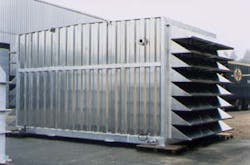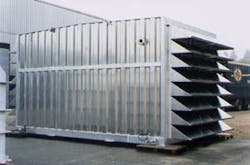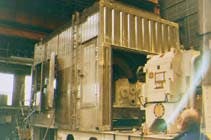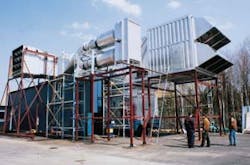Further orders secured for installation on BP gas turbines
Peter SandbergFurther successes in the UK sector have been notched up by Industrifilter with orders for its filtration and acoustical systems for BP's Cleeton and ETAP projects. Last year, the company delivered a full package of filtration equipment and acoustical enclosures for BP's Andrew platform. Its latest orders call for a single full package for Cleeton and two inlet and exhaust system packages for ETAP. In all three projects, the equipment will be installed on GT35 gas turbines supplied by ABB Stal for compressor drive.
Industrifilter
In all cases, the enclosures will also be made of aluminium. "Aluminium is now the dominant metal for enclosures, both because of its low weight and its anti-corrosion qualities," says sales manager Peter Sandberg. "It's now accepted a being as good as stainless steel. Our deliveries to BP represent something of a breakthrough in the UK in this respect."
Aluminium is not only somewhat cheaper than stainless steel, but offers substantial weight savings. The aluminium equipment for Andrew weighed more than 40% less than the equivalent weight in stainless steel.
In the Norwegian sector aluminium is already established as the standard material for enclosures. Industrifilter is also well established as a supplier. Its latest orders entail two full packages each for Norsk Hydro's Njord and Visund projects. In both cases the equipment will be fitted to General Electric LM2500 gas turbines being used for power generation.
These orders were placed by Kvaerner Energy in Oslo. The contractor has been a customer for Industrifilter's filtration and acoustic systems since the early 1980s, when it placed orders for Statoil's Statfjord B and C platforms.
Other orders placed by Kvaerner Energy have included Saga's Snorre project, the first in the North Sea to use aluminium in the entire gas turbine package, and more recently, Vigdis.
Norsok result?
A continuing relationship between supplier and contractor can generate benefits for the end-user, Sandberg says. "We work together with our customers to try to reduce design differences as much as possible. In this way we can lower the cost of the equipment supply and achieve shorter delivery times."
The equipment supplied for Njord, Visund and Vigdis incorporates similar design concepts, including the same arrangement of the filter system and the same circular exhaust silencers. This is a novelty, as Industrifilter's exhaust silencers are traditionally rectangular.
The company now plans to boost its sales of filter coalescer systems in general. "This is a good niche which we plan to develop," says Sandberg. "It represents a steady flow of work with a lot of upgrading and retrofitting under way. Because of the recent growth on the turbine side, we haven't been able to develop it as much as we would like."
The filter system uses vane separators to remove the larger droplets, and fibre for the smaller ones. Micro-filters can be added if greater efficiencies are required.
The company favours the use of low-velocity systems (which drain the filter media by means of gravity) as offering clear economic advantages over high-velocity systems.
Savings with low pressure drop
The low-velocity system involves a pressure drop of 300-400 pascals, which is about half the drop of an equivalent high-velocity system. The same efficiency of operation can be achieved with a lower fuel consumption, Sandberg says. This not only saves fuel costs, but in Norway reduces carbon dioxide tax liability. "We calculate that Norwegian users of our low-velocity systems save about NKr100,000 a year in CO2 tax per turbine."
The company now uses high capacity cartridge filters in its filtration systems. Compared with previous types, the new cartridge provides a bigger filter area, which in turn makes for a lower pressure drop and consequent fuel savings. Depending on his particular circumstances, the client might want to take the benefit in the form of a smaller filtration unit giving the same pressure drop.
For more information contact Peter Sandberg, Industrifilter: tel: +46 33 178500 or fax +46 33 178555.
BP Cleeton aluminum enclosure/filtration system.
Njord system under test at Kvaerner Energy, Egersund.
BP Andrew package during tests at Finspong.



